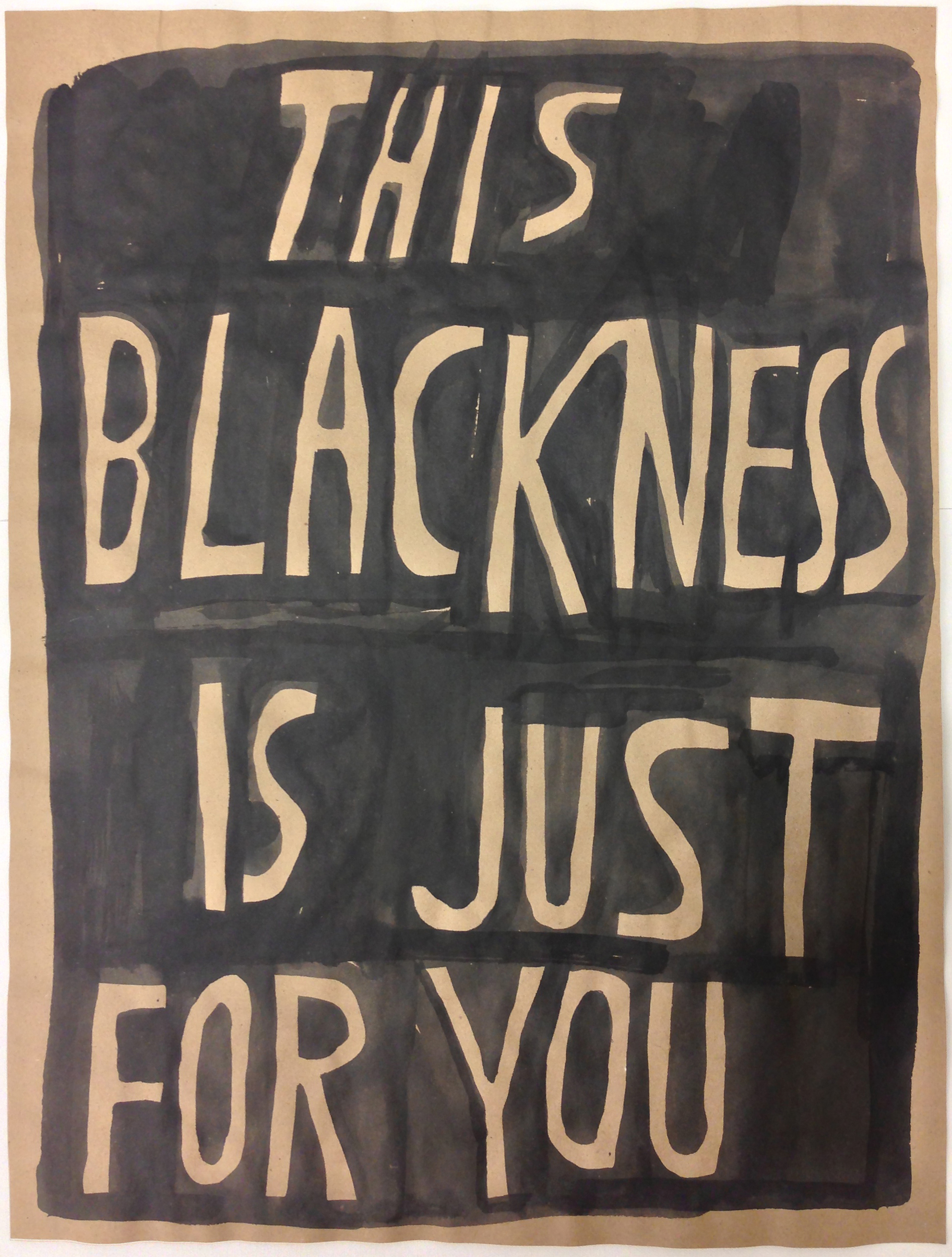 (DePaul University/Jeff Carrion)
(DePaul University/Jeff Carrion)In a new site-specific billboard exhibition at DePaul Art Museum viewable from the Chicago Transit Authority’s Fullerton ‘L’ platform, Chicago-based artist Ayanah Moor asks audiences to question our personal and national progress, intentions and methods of change surrounding issues of equity and inclusion.
“Ayanah Moor’s text-based works are incredibly powerful,” says Laura-Caroline de Lara, interim director of DePaul Art Museum and the exhibition’s curator. “Moor’s site-specific designs for the museum and their placement on our building set in a university campus are a pertinent and crucial reminder that we as a city and as a university community have much work to do around these issues.”
The artist’s text-based paintings started years before the current moment of protest poster aesthetics and neighborhood storefronts announcing their alliances with Black, brown and LGBTQ+ groups through window displays, de Lara says. For her DePaul Art Museum exhibition, Moor challenges audiences to ask whether their personal alliances are swift and superficial, or deeply rooted and ready for hard-fought change.
 Chicago-based artist Ayanah Moor's work is now on display at DePaul Art Museum. Four separate billboards combine to make up Moor’s exhibition called “for you,” with each text-based piece displaying a reconfiguration of the same phrase “This blackness is just for you.” (Images courtesy of Ayanah Moor.)
Chicago-based artist Ayanah Moor's work is now on display at DePaul Art Museum. Four separate billboards combine to make up Moor’s exhibition called “for you,” with each text-based piece displaying a reconfiguration of the same phrase “This blackness is just for you.” (Images courtesy of Ayanah Moor.) Four separate billboards combine to make up Moor’s exhibition called “for you,” with each text-based piece displaying a reconfiguration of the same phrase “This blackness is just for you,” asking audiences to consider how the meaning of the phrase changes as each word and its emphasis are rearranged.
"In my artwork, text-as-image can affirm, complicate or challenge the viewer’s thinking, and I’m most drawn to messages that allow the viewer to participate in making meaning," Moor says.
Her hope is that audiences rethink and unlearn their relationships to the issues of race, politics and progress through the act of wordplay and the power of individual words in her artwork. She invites audiences to read the work through their personal histories, perspectives and observations and to question their own, as well as the artist’s, motives and relationships to the concept of Blackness, race and color theory in social and art historical contexts. Moor asks, what is in a name, a label or a color; how does the power of words change with our inflection of tone as we perform and pronounce them; and how can changing one word or the order of one segment of a phrase completely reimagine its meaning.
An investigation into her own experiences in academia — specifically in relationship to diversity initiatives in university settings — Moor’s work wrestles with the problematics for people of color in accepting invitations to participate in environments and systems not historically built for or in consideration of them. She engages with how these settings and their intentions can both help and harm communities of color.
At DePaul Art Museum, Moor’s text-based works are positioned in a transitional location: both physically on and off a university campus, at and outside of a museum, and for audiences literally in-between places on the ‘L’ platform.
Posing her tongue-in-cheek phrases in this specific locale, the artist asks audiences to consider what the process of change really looks like within their institutional systems and how their physical and historical environments influence their reading, understanding and engagement with certain visual cues.
“Certainly, the artist’s pieces are timely, given our current sociopolitical situations, but the subject matter is by no means new. As a museum, our aim is to raise timeless questions for our community and ourselves, in hopes of provoking possible answers, solutions and change,” de Lara says.
Moor lives and works in Chicago, and has participated in numerous exhibitions around the world, including the Museum of Contemporary Art Chicago and Museum of Contemporary Photography in Chicago; The Andy Warhol Museum in Pittsburgh; ONE National Gay and Lesbian Archives — University of Southern California Libraries in Los Angeles; Proyecto ‘ace in Buenos Aires; Urban Institute for Contemporary Arts in Grand Rapids, Michigan; daadgalerie in Berlin; and The Studio Museum in Harlem, New York.
Her work is featured in “Incite: Journal of Experimental Media, Sports Issue (2017),” by Astria Suparak and Brett Kashmere; “Troubling Vision: Performance, Visuality, and Blackness (2011),” by Nicole Fleetwood; and “What is Contemporary Art? (2009),” by Terry E. Smith.
The site-specific installation is currently on view and runs through Dec. 28. Each billboard is also available for
viewing online.
“For you” is one of two outdoor installations viewable at DePaul Art Museum through the end of the calendar year. The museum’s front windows located on Fullerton Avenue are dedicated to
Kathryn Andrews’ work about women presidential candidates and features the names of 87 women who have run for the highest office in the United States. Additional information about DePaul Art Museum
is online or by calling (
773) 325-7506.